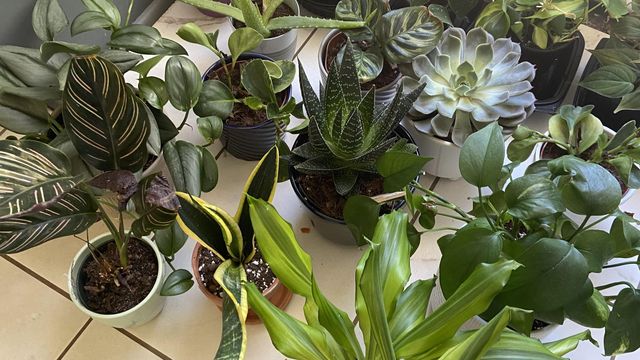Tips, tricks to help your plants grow
I’ve always been someone with a notable inability to make plants grow. No matter what I did or how much I wanted to have a house full of plants, it never seemed to click for me. Without fail the vengeful pots of lush greenery would shrivel into nothing before my eyes. Apparently my approach to plant care, which oscillated from pure neglect to overly enthusiastic daily watering, was problematic to their survival. Today, however, I feel a distinct sense of pride over the dozen thriving houseplants now taking up residence in my home.
Two things shifted for me, making me a proud new “plant mom.”
A year and a half ago a friend gifted me a potted pothos for my birthday. I laughed as I opened the gift bag, graciously thanking her for what I was sure would be a sad and short-lived plant’s life. I told myself I would enjoy the beautiful vibrant leaves for the next month or so, because that was typically the extent of how long I could keep a plant alive.
She knows me well and caught the tone of my voice as I thanked her. Laughing, she explained that she had picked this plant specifically for me because it was such an easy plant to care for. I smiled, but still felt doubtful. I’ve had these so called easy to care for plants before.
I put my new pothos right in front of a window and started checking in on it every morning. One day I noticed it’s leaves looked a little droopy, so I watered it. The next day lo and behold she had perked right back up. I was hooked, I was learning to “read” my plant and it became my mission to keep this little green baby alive.
A few months later I hosted a workshop at Copperline Plant Co. for a group of HER Circle moms and found my passion for houseplants taking root (pun intended). Anna Grace, the owner of Copperline Plant Company is incredibly knowledgeable about plants while simultaneously making plant ownership approachable, even for novices like me.
She shared with us a whole host of simple tips and tricks that completely changed my comfort level and approach to plant ownership. For example, the main reason plants get sick often has to do with too much water rather than not enough. She also discussed the best places to keep plants in your home. Not any old window in your house will do. Each plant has different needs and each window in your home offers a different type of light. Thanks to Anna Grace’s guidance, my single potted pothos has grown to become a dozen different plants, 95% of which are flourishing under my attentive care.
I had the pleasure of sitting down with Anna Grace to pick her brain a bit more on all things houseplants. Here are some of my favorite takeaways from our conversation.
Houseplants are beneficial
Recent studies have shown that access to green space, even if it is just visual, can increase productivity and decrease stress. More and more studies have been investigating the impact of microbes in soil increasing our dopamine levels as well. Studies and research aside, as Anna Grace says, “houseplants are a simple way for me to take time for myself. The ritual of caring for something else allows me to be present and to take a deep breath. The excitement I feel when I see a new leaf come in never gets old. We have ancient relationships with plants, so it is only natural that we feel good when we are surrounded by them”
Easy houseplants for beginners
In the shop, we talk a lot about choosing the right plant for the right place. While Cacti are "easy" plants, if you try to grow it in a bathroom with no windows, it won't be happy. Snake Plants, ZZ Plants and Pothos are some of Anna Grace’s go-to beginner friendly plants because they are adaptable to lots of different lighting conditions and prefer to dry out well between watering. Every plant can be an easy plant, when you have the right growing conditions.
Additional considerations when selecting a houseplant
Anna Grace aims to provide customers with as much knowledge as possible, but she suggests everyone does their own research before bringing home a new plant. Certain plants are more toxic than others to our pets (Dieffenbachia, Euphorbia, and Lilys to name a few), but each pet, and each home is different. In general, it is good practice to keep your plants out of reach of children and pets, especially if they are still learning not to put things in their mouths. As long as you are doing this, the only real risk that homeowners should be aware of is running out of room for more plants.
Signs of a struggling houseplant
A common misconception for beginner plant people is that a yellowing leaf is a sign that your plant is unhappy or unhealthy, and that you're doing something wrong. According to Anna Grace, that's just simply not always the case. Leaves located towards the bottom of the plant are typically the oldest leaves on the plant. It's normal for them to die over time because they've given everything they've got.
Yellowing or discoloration in the leaves may be a warning sign that your plant is struggling. That said, the kind of struggle is not always apparent. According to Anna Grace, “The first thing I always do when I suspect that my plant is in trouble is to check the roots - more often than not, I see plants that are struggling because they're in the wrong size pot, or they're in the wrong sort of lighting.” Internet resources can be helpful, but confusing.
Plants make us feel happy. And so when our plants seem unhappy, it's no surprise that it stresses us out. If you have a bunch of leaves, especially new ones, that are starting to yellow or fall off the plant, come find a local plant shop like Copperline Plant Company located in City Market in downtown Raleigh to help you troubleshoot and get your potted plant baby flourishing again.
Crissy Fishbane is the co-founder of HER Health Collective, a supportive community and resource hub for moms. She is a certified therapeutic exercise specialist, personal trainer, wellness coach, and former high-school psychology teacher. Crissy believes in a holistic approach to women’s health and is a strong advocate of improved screening and treatment of perinatal mood disorders. She is passionate about building a supportive community for moms where they can make genuine connections and build authentic relationships. Crissy is a regular Go Ask Mom contributor.















